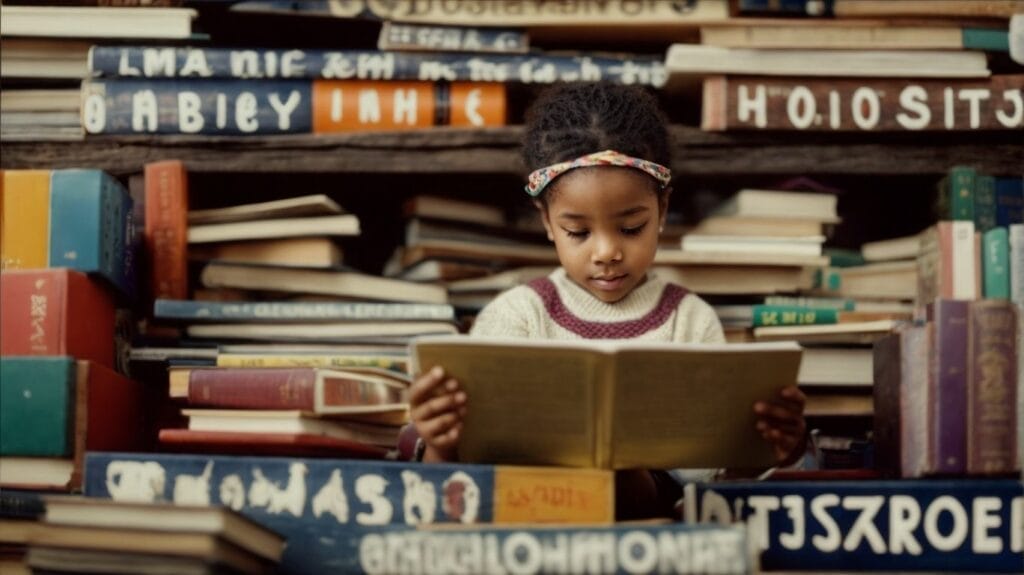Welcome to our comprehensive guide to early childhood books! In this article, we have curated a list of the top 50 early childhood books, along with the latest rankings, popular articles, and a wide range of resources for early childhood education. Whether you are a parent, educator, or anyone interested in the development and well-being of young children, this guide is tailored to provide valuable insights and recommendations for enhancing early childhood education.
From books focusing on inclusive education, language, and learning resources to effective communication with children and the importance of play, we have covered an array of topics to support the diverse needs of early childhood educators and caregivers. We delve into critical perspectives on early childhood education, child development, teaching strategies, parental engagement, professional development, and essential resources and tools for the field.
We aim to offer a one-stop resource for those passionate about creating enriching experiences for young children in their formative years. Whether you are seeking lesson plans, curriculum evaluation, or supervision and management insights, this guide is designed to provide valuable information to support your journey in early childhood education. So, let’s begin exploring the world of early childhood books and education and discover how these resources can contribute to the holistic growth and development of our youngest learners.
Key Takeaways:
- Early childhood books provide valuable resources for both educators and parents to support children’s development and education.
- Inclusive early childhood education books promote diversity and teach children about different backgrounds and cultures.
- The use of language, play, and effective communication are key components in early childhood education and can be facilitated through books and lesson plans.
Early Childhood Books
Early childhood books play a crucial role in shaping young minds and fostering a love for reading and learning.
The significance of early childhood books cannot be overstated when it comes to fostering a love for reading among young children. By introducing them to diverse characters, engaging narratives, and imaginative settings, these books not only entertain but also stimulate a child’s curiosity and creativity. Early childhood books are instrumental in laying the foundation for language development, cognitive skills, and socio-emotional growth.
Through colorful illustrations and simple yet engaging storytelling, these books capture the attention of young readers, instilling in them a lifelong passion for reading. They also serve as powerful tools for parents and educators to impart valuable lessons, moral values, and essential life skills to children in an accessible and enjoyable manner.
Top 50 Early Childhood Books
The top 50 early childhood books encompass a diverse collection of literary works that captivate and inspire young readers from different backgrounds and age groups.
Latest Rankings
The latest rankings of early childhood books showcase the current trends and preferences in children’s literature, reflecting the evolving interests and needs of young readers.
These rankings provide valuable insights into the most sought-after titles, shedding light on the narratives and themes that resonate with children worldwide. Through these rankings, caregivers and educators gain a deeper understanding of the literary landscape for young readers, enabling them to curate enriching reading experiences.
It also underscores the impact of storytelling in shaping young minds and fostering a love for reading from an early age.
Popular Articles
Popular articles on early childhood books offer valuable insights and recommendations for parents, educators, and anyone passionate about nurturing young readers and supporting early childhood development.
These articles delve into the importance of introducing books to children from an early age, highlighting the profound impact they can have on cognitive development and language acquisition. They often provide curated lists of recommended titles, showcasing diverse narratives and engaging illustrations that foster a love for reading in young minds.
These articles often discuss the role of storytelling in stimulating imagination and empathy and promoting key social and emotional learning skills.
Best Books for Early Childhood Education
Identifying the best books for early childhood education involves considering a diverse range of literary works that cater to the developmental needs and interests of young readers.
These books should not only foster a love for reading but also impart important lessons and values.
Well-loved classics such as ‘Where the Wild Things Are’ by Maurice Sendak capture the imagination and teach valuable life lessons.
Additionally, ‘The Very Hungry Caterpillar’ by Eric Carle introduces young readers to the concept of transformation in a simple and captivating manner. The vibrant illustrations and engaging narrative make these books valuable additions to any early childhood education program.
Early Childhood Education Books for Development
Early childhood education books tailored for development address key aspects of cognitive, emotional, and social growth, providing valuable resources for educators, parents, and caregivers.
These books offer activities that enhance critical thinking skills, empathy development, and social interaction in young children. By integrating storytelling, narratives, and creative expression, these books nurture language development and imagination. They also aid in emotional intelligence by exploring themes of diversity, emotions, and self-awareness.
Through interactive content and age-appropriate concepts, these books lay the foundation for pre-literacy skills and numeracy. They play a pivotal role in the holistic growth and development of young children.
Books for Inclusive Early Childhood Education
Books for inclusive early childhood education celebrate diversity, equity, and inclusion, offering narratives that resonate with children from varied backgrounds, cultures, and experiences.
These books play a vital role in fostering a sense of belonging and understanding in young readers. They feature inclusive characters and storylines that reflect diverse family structures, abilities, and languages. By incorporating themes of empathy, acceptance, and respect for differences, these books help children develop a positive attitude toward inclusivity. In addition, they introduce young minds to the concept of equity by depicting fair representations of individuals from all walks of life.
Lesson Plans and Activities for Early Childhood Education
Comprehensive lesson plans and engaging activities serve as cornerstones in early childhood education, enabling educators to create meaningful learning experiences for preschoolers and young learners.
These well-structured lesson plans are crafted with a deep understanding of the developmental needs of young children, incorporating various activities and strategies to cater to their diverse learning styles and abilities.
By carefully integrating activities that promote exploration, creativity, and critical thinking, educators can ignite children’s curiosity and instill a love for learning at a crucial stage of their development.
Engaging lesson plans and activities not only fosters cognitive and academic growth but also nurtures social and emotional skills, laying a solid foundation for future learning and overall well-being.
Language and Learning Resources for Early Childhood Education
Language and learning resources tailored for early childhood education play a pivotal role in nurturing language development, literacy skills, and cognitive growth in preschoolers under the guidance of educators.
These resources are carefully designed to stimulate young children’s curiosity and provide opportunities for language-rich interactions, helping them build vocabulary, comprehension, and communication abilities. Engaging activities such as storytelling, rhyming games, and sensory experiences assist in honing essential literacy skills while fostering creativity and critical thinking.
By integrating elements of play, exploration, and structured learning, these resources promote holistic development, laying a strong foundation for future academic success.
Supervision and Management in Early Childhood Education
Effective supervision and management strategies are essential components of early childhood education, ensuring a safe, nurturing, and conducive learning environment for young children under the care of educators.
Proper supervision and management not only maintain order and safety in the classroom but also play a profound role in shaping the cognitive and emotional development of children. Through appropriate guidance, educators can positively influence child psychology by fostering a sense of security, trust, and psychological well-being.
Effective supervision and management strategies impact classroom dynamics, promoting engagement, collaboration, and effective communication among students. Educators also benefit from clear guidance and support, enhancing their ability to create meaningful educational experiences that cater to individual child needs and developmental milestones.
In essence, supervision and management in early childhood education are crucial for fostering positive, nurturing relationships, creating supportive, child-centered classroom environments, and maximizing the potential for children to thrive and develop holistically.
Introduction to Early Childhood Education
An introduction to early childhood education provides foundational insights for educators, parents, and anyone involved in nurturing and supporting the learning journey of young learners.
Early childhood education focuses on the holistic development of children, encompassing cognitive, social, emotional, and physical growth. The principles of early childhood education aim to create nurturing and stimulating environments that foster exploration, curiosity, and creativity. By recognizing the significance of play-based and child-centered approaches, educators can effectively support children in their formative years, laying the groundwork for lifelong learning and academic success.
The impact of quality early childhood education extends beyond academic achievement, influencing social skills, emotional resilience, and overall well-being.
Effective Communication with Children
Effective communication with children forms the bedrock of meaningful interactions, understanding, and support within the context of early childhood education, fostering positive relationships between educators, parents, and young learners.
When educators skillfully communicate with young learners, they can better understand their needs, emotions, and individual strengths, facilitating a nurturing and supportive environment for their growth and development. Furthermore, clear and effective communication between educators and parents establishes a collaborative partnership in the educational journey of the child, ensuring consistency and alignment between home and school settings. This open dialogue encourages parental involvement and enables parents to participate actively in their child’s learning experiences, ultimately enhancing the child’s overall educational outcomes.
Importance of Play in Early Childhood Education
The importance of play in early childhood education cannot be overstated, as it serves as a cornerstone for holistic development, socio-emotional learning, and creativity among preschoolers under the guidance of educators.
Play activities provide opportunities for children to explore, experiment, and engage in imaginative scenarios, fostering their cognitive abilities and problem-solving skills. Through play, children also develop their social skills, learning how to share, take turns, and cooperate with their peers, which are essential for their socio-emotional growth. Play encourages self-expression, enabling children to express their thoughts, emotions, and ideas freely, nurturing their creativity and individuality.
Diversity and Inclusion in Early Childhood Education
Championing diversity and inclusion in early childhood education fosters an environment of equity, empathy, and respect, embracing the uniqueness and varied experiences of children in the pursuit of social justice and educational inclusivity.
When educators prioritize diversity and inclusion, they create a learning environment that encourages understanding and appreciation of different cultures, backgrounds, and abilities. This proactive approach not only enriches the educational experience of all children but also cultivates a sense of belonging and acceptance. It enables children to develop positive attitudes towards diversity and equips them with essential social skills that lay a strong foundation for future interactions.
Embracing diversity and inclusion in early childhood education lays the groundwork for dismantling stereotypes and biases, promoting a more equitable society as these children grow into adults.
Critical Perspectives on Early Childhood Education
Critical perspectives on early childhood education provide valuable insights and analyses, enriching the discourse on child development, educational practices, and the roles of educators in nurturing the potential of preschoolers.
These perspectives not only offer a deeper understanding of early childhood education but also shed light on the various influences that shape a child’s learning journey. By exploring the impact of socio-cultural, psychological, and pedagogical factors on children’s development, educators can tailor their teaching methods to support each child’s unique needs better.
These critical perspectives prompt reflective discussions on the evolving landscape of education, encouraging educators and policymakers to adapt and refine their practices to enhance the educational experiences of young learners.
Child Development and Well-Being
Child development and well-being lie at the heart of early childhood education, shaping the growth, potential, and overall happiness of young learners under the care of educators and parents.
Understanding the critical nature of early childhood education is essential to provide the best possible foundation for children’s future success. A nurturing environment and guiding support during this formative period can significantly impact a child’s cognitive, emotional, and social development. The involvement of parents is equally crucial in complementing the efforts of educators, as they serve as the primary influencers in a child’s early years. With the right combination of care, education, and support, children can thrive and build a strong foundation for their future learning and well-being.
Teaching Strategies in Early Childhood Education
Effective teaching strategies in early childhood education encompass a diverse array of approaches, methodologies, and techniques that cater to the unique learning needs and developmental stages of preschoolers under the guidance of educators.
These strategies play a crucial role in shaping the cognitive, social, and emotional development of young children. By incorporating multisensory activities, such as music, art, and storytelling, teachers can create an engaging and stimulating learning environment. Furthermore, play-based learning methodologies promote creativity, problem-solving, and collaboration. Educators need to adapt their approaches to accommodate diverse learning styles and abilities, fostering an inclusive and supportive atmosphere.
Curriculum and Program Evaluation
Curriculum and program evaluation in early childhood education serve as essential tools for assessing the effectiveness, relevance, and impact of educational initiatives on child development within the classroom environment.
Evaluating the curriculum and programs ensures that they are tailored to meet the developmental needs of young learners, providing a framework for creating meaningful learning experiences. It allows educators to identify areas for improvement and adaptation, promoting a dynamic and responsive approach to teaching. Such evaluations play a crucial role in shaping classroom dynamics and fostering an environment conducive to holistic child development.
The insights gained from evaluation efforts inform educators and administrators about the efficacy of teaching methods, materials, and overall program design, ultimately influencing educational outcomes.
Parental Engagement and Supportive Resources
Parental engagement and supportive resources play a pivotal role in bolstering the educational journey and well-being of young children, fostering collaborative partnerships between parents, educators, and children within the context of early childhood education.
This engagement not only lays the foundation for academic success but also nurtures emotional and social development. Parental involvement has been found to positively impact children’s cognitive skills, language proficiency, and overall readiness for school. When parents actively participate in their child’s learning experiences, it creates a strong support system, enhancing the child’s confidence and motivation to explore and learn.
Providing parents with educational resources and guidance enables them to contribute actively to their child’s learning. These resources can include informative workshops, access to educational materials, and guidance on developmental milestones, enabling parents to create a stimulating learning environment at home.
Early Childhood Education Professional Development
Professional development in early childhood education enables educators with the knowledge, skills, and resources to adapt to evolving pedagogical approaches, technological advancements, and the diverse needs of young learners.
This ongoing growth and learning not only enhances the educator’s instructional methods but also ensures that they are equipped to effectively support various stages of child development, from infancy through early childhood. Proper training in early childhood development and education provides teachers with the necessary understanding of cognitive, social, emotional, and physical milestones, enabling them to create developmentally appropriate learning experiences for children.
Integration of technology plays a crucial role in modern pedagogy, allowing educators to engage young learners through interactive and immersive learning tools.
Early Childhood Education Resources and Tools
Diverse resources and tools in early childhood education offer valuable support for educators, parents, and children, fostering literacy, creativity, and holistic development throughout the learning journey.
From interactive storybooks that enrich language skills to sensory play materials that enhance cognitive and motor development, these resources play a pivotal role in shaping a well-rounded educational experience. Educational games and technology-based learning platforms not only make learning fun but also cater to individual learning styles, ensuring inclusivity.
Access to diverse resources enables educators to cater to the unique needs and interests of each child, creating a dynamic and engaging learning environment that promotes collaboration and imagination.
Frequently Asked Questions
What are early childhood books?
Early childhood books are specifically designed for children aged 0-5 years old. They include picture books, board books, and interactive books that are developmentally appropriate for young children.
Why are early childhood books important?
Early childhood books play a crucial role in a child’s development. They help promote language and literacy skills, encourage imagination and creativity, and can also teach important life lessons.
What are some popular early childhood books?
Some popular early childhood books include “The Very Hungry Caterpillar” by Eric Carle, “Goodnight Moon” by Margaret Wise Brown, and “Where the Wild Things Are” by Maurice Sendak.
Are early childhood books only for entertainment?
No, early childhood books serve more than just entertainment purposes. They also help children learn about the world around them, develop empathy and social skills, and stimulate their cognitive and emotional growth.
What should I look for in an early childhood book?
When choosing an early childhood book, look for books with simple and repetitive text, colorful and engaging illustrations, and age-appropriate content that aligns with your child’s interests and developmental level.
How can I encourage my child to read early childhood books?
One way to encourage your child to read early childhood books is by incorporating them into your daily routine, such as reading a book before bedtime. You can also make reading a fun and interactive activity by asking your child questions and involving them in the story.


